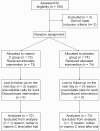Intravenous vitamin C administration reduces fatigue in office workers: a double-blind randomized controlled trial
- PMID: 22264303
- PMCID: PMC3273429
- DOI: 10.1186/1475-2891-11-7
Intravenous vitamin C administration reduces fatigue in office workers: a double-blind randomized controlled trial
Abstract
Background: Studies of the efficacy of vitamin C treatment for fatigue have yielded inconsistent results. One of the reasons for this inconsistency could be the difference in delivery routes. Therefore, we planned a clinical trial with intravenous vitamin C administration.
Methods: We evaluated the effect of intravenous vitamin C on fatigue in office workers. A group of 141 healthy volunteers, aged 20 to 49 years participated in this randomized, double-blind, controlled clinical trial. The trial group received 10 grams of vitamin C with normal saline intravenously, while the placebo group received normal saline only. Since vitamin C is a well-known antioxidant, oxidative stress was measured. Fatigue score, oxidative stress, and plasma vitamin C levels were measured before intervention, and again two hours and one day after intervention. Adverse events were monitored.
Results: The fatigue scores measured at two hours after intervention and one day after intervention were significantly different between the two groups (p = 0.004); fatigue scores decreased in the vitamin C group after two hours and remained lower for one day. Trial also led to higher plasma vitamin C levels and lower oxidative stress compared to the placebo group (p < 0.001, p < 0.001, respectively). When data analysis was refined by dividing each group into high-baseline and low-baseline subgroups, it was observed that fatigue was reduced in the lower baseline vitamin C level group after two hours and after one day (p = 0.004). The same did not hold for the higher baseline group (p = 0.206).
Conclusion: Thus, intravenous vitamin C reduced fatigue at two hours, and the effect persisted for one day. There were no significant differences in adverse events between two groups. High dose intravenous vitamin C proved to be safe and effective against fatigue in this study.
Trial registration: The clinical trial registration of this trial is http://ClinicalTrials.govNCT00633581.
Figures
References
-
- Richards RS, Roberts TK, McGregor NR, Dunstan RH, Butt HL. Blood parameters indicative of oxidative stress are associated with symptom expression in chronic fatigue syndrome. Redox Rep. 2000;5(1):35–41. - PubMed
-
- Mantovani G, Maccio A, Madeddu C, Mura L, Massa E, Gramignano G, Lusso MR, Murgia V, Camboni P, Ferreli L. Reactive oxygen species, antioxidant mechanisms and serum cytokine levels in cancer patients: impact of an antioxidant treatment. J Cell Mol Med. 2002;6(4):570–582. doi: 10.1111/j.1582-4934.2002.tb00455.x. - DOI - PMC - PubMed
-
- Bryer SC, Goldfarb AH. Effect of high dose vitamin C supplementation on muscle soreness, damage, function, and oxidative stress to eccentric exercise. Int J Sport Nutr Exerc Metab. 2006;16(3):270–280. - PubMed
Publication types
MeSH terms
Substances
Associated data
LinkOut - more resources
Full Text Sources
Medical



